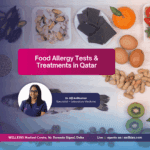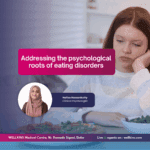Author:Dr. Mary Swapna Metreenj (General Practitioner – WELLKINS Medical Centre)
Studies have shown that a significant part of today’s medical illnesses is, in one way or another, caused by unaddressed stress. Stress is not a medical condition, but it can undoubtedly lead to serious illness if not addressed. Recognizing the significance of managing workplace stress is crucial for unlocking the full potential of each individual and allowing employees to savor life to the fullest with their friends and family

Stress is the non-specific response of the body to any demand for change. Stress levels vary from one person to another, as does how one accepts the challenges brought by stress. One’s inability to adjust and manage their respective stress can lead to fatigue—an extreme tiredness typically resulting from physical, mental, emotional exertion, or illness
This would initially start with minor symptoms, such as forgetting one or two daily tasks, stomach upset, or even a headache. This then leads the person to self-medicate or make minor adjustments in their daily living to alleviate the problem. But as the stress remains unmanaged and the workload or working hours become more demanding, the physical, mental, and emotional manifestations become more evident.
Stress is the body’s non-specific response to demands for change, and its impact varies from person to person. Inability to manage stress can result in fatigue, characterized by extreme tiredness stemming from physical, mental, emotional exertion, or illness. Initial symptoms may include forgetfulness, stomach upset, or headaches, progressing to more pronounced manifestations with increasing work demands.
Who is at high risk?
- Those who are new to their job.
- Those who have little opportunity to use their skills and little authority over decisions.
- Those who have little control over their work.
- Those with heavy workloads.
- Those with pre-existing illnesses such as Hypertension, Diabetes, Asthma, or anything similar.
Stress is the product of overload from work, anxiety, fear, worry, illness, injury, or trauma. It has also been noted that major life events can be significant precipitants of stress, such as financial difficulties, job changes, relationship discord, and the death of a family member. Positive events like upcoming weddings can also have an impact and serve as powerful stressors to the person.
Unfortunately, the majority of us would initially fall for unhealthy ways of coping with stress, such as smoking, drinking too much, over or under-eating, withdrawing from friends and family members, and procrastinating, to name a few.

Early Effects of Stress Body Complaints
- Headache and nape pain
- Muscle tension or pain
- Chest pain
- Tiredness
- Change in libido
- Stomach discomfort
- Sleep disturbances
Mood Changes
- Anxiety
- Restlessness
- Lack of motivation
- Difficulty in focusing on the task at hand
- Irritability
- Easily angered
- Sadness or depression
Behavior Changes
- Eating too much or eating less
- Angry outbursts
- Drug or alcohol abuse
- Tobacco use
- Social withdrawal
Without effective intervention, stress continues without relief, fatigue ensues, leading to exhaustion, burnout, depression, illnesses, chronic pain, and the degeneration of the immune system. Moreover, a person can also show signs of disruptive behavior, thereby losing one’s situational awareness—that constant state of knowing what is going on in your immediate environment, why it is happening, and what is likely to happen next.
Medically, people who fall victim to repetitive and unresolved stress usually manifest recurrent respiratory tract infections, tension and migraine headaches, hypertension, impotence, insomnia, digestive disorders, musculoskeletal pains, diabetes mellitus, and obesity, to name a few.
How to manage your stress?
Be active.
Exercise or engage in a new sport. Exercise and sports encourage us to be in the right state of mind. A good sweat allows us to feel a sense of achievement.
Connect with people.
Having a stable support network of friends and family builds one’s confidence. This support network allows us to have a venue or the go-to person where we can ventilate our feelings and listen to sound suggestions from people whom we love and trust.
Avoid unhealthy habits.
Since stress can be repetitive and prolonged, exposure to unhealthy habits will only hasten the development of medical illnesses, further adding to the piled-up stressors one is already facing. Eat healthily and avoid vices.
Work smarter, not harder.
Learn to delegate. Organize your work. Know your co-workers. They may be able to give you pointers on how you can be efficient with your tasks. Systematizing work allows us to work to our full potential without overworking ourselves. This takes time, but be patient.
‘Me time’.
Yoga, massage, tai chi, meditation, praying, reading a good book allow us to free our minds of reminders of our responsibilities and difficulties. It also allows us to focus our minds and, at times, find solutions to our stressors.
Do charity work.
Nothing beats giving a piece of yourself to the betterment of the helpless. Donating old clothes, volunteering in soup kitchens, giving gifts to orphanages, or retirement homes for abandoned seniors are but a few ways where we can give a piece of our hearts and reap the return of their overwhelming gratitude.
Accept things you cannot change.
This is one hard thing to do. But it is true, and not all things can be managed by us. Trust in time that things will get better and will unfold as life dictates it to be. Time will allow us to accept things and move forward and rise above the stress.
Seek professional help.
Your general practitioner can assist in identifying the potential stressor that has been causing your medical complaints. Your doctor can request you to undergo the necessary tests and suggest ways to address such stressors.
Life will never be stress-free. There will always be something or someone to challenge us and our capabilities as a person working through life and for life. We must then surround ourselves with positive people and always be aware that something can be done or someone out there can aid us during difficult times.







